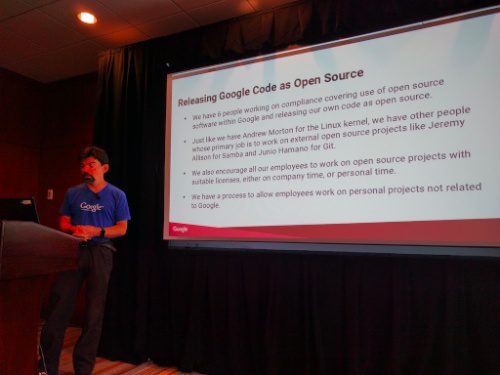TORONTO — Marc Merlin has been working as an engineer at Google since 2002 and has seen (and done) a lot of open source and Linux work during that time. Speaking at the LinuxCon North America event this week, Merlin provided a standing room only audience with an overview how Google uses and contributes to open source.
“Google wouldn’t be around today without open source software,” Merlin said.
Merlin noted that in its early days Google had limited resources to contribute back to open source. Additionally the first generation of Google’s software was all written to be for internal-use and wasn’t originally designed to be open source. He added that it’s not easy to open source software, after the fact. That said even for early components that Google didn’t initially open source, Google wrote technical papers describing the methods used and the code in a way that let others implement the same approaches.
Across a broad landscape of open source technologies, Google’s earliest contribution were often bug fixes.
“We were often the first one to find and fix obscure bugs that only happened at our scale,” Merlin said.
To date, Merlin said that Google has contributed over 5,000 patches to the Linux kernel. The patches range from small fixes to full drivers and subsystems like containers as well.
When it comes to Google’s own open source efforts, there are over 3,000 open source project on Github today. In order for Google to manage the whole process from a legal perspective, Merlin said that Google has six people working on compliance issue for using open-source within Google as well as releasing open source code.
In order to keep things legally aligned, Google stores all external open source code in a third party hierarchy. Merlin added that Google only allows the use of open source software with licences that Google is able to comply with. One license that Google will not work with is the AGPL (Affero General Public License), which is a reciprocal license that requires those that use the code to provide a link to the source
“The cost of ensuring that we don’t have AGPL code involved in any way in one of our externally facing products is too high compared to the price of fining an alternative or writing our own under a less restrictive license,” Merlin said.
For those that contribute code to Google projects, Google requires developers to agree to a Contributor License Agreement (CLA). The CLA basically enable Google to re-license contributed code and provides Google with a patent grant for the code.
“You retain ownership to your code, you are just granting a license to Google,” Merlin said.

Marc Merlin at LinuxCon North America
Sean Michael Kerner is a senior editor at Datamation and InternetNews.com. Follow him on Twitter @TechJournalist
Huawei’s AI Update: Things Are Moving Faster Than We Think
FEATURE | By Rob Enderle,
December 04, 2020
Keeping Machine Learning Algorithms Honest in the ‘Ethics-First’ Era
ARTIFICIAL INTELLIGENCE | By Guest Author,
November 18, 2020
Key Trends in Chatbots and RPA
FEATURE | By Guest Author,
November 10, 2020
FEATURE | By Samuel Greengard,
November 05, 2020
ARTIFICIAL INTELLIGENCE | By Guest Author,
November 02, 2020
How Intel’s Work With Autonomous Cars Could Redefine General Purpose AI
ARTIFICIAL INTELLIGENCE | By Rob Enderle,
October 29, 2020
Dell Technologies World: Weaving Together Human And Machine Interaction For AI And Robotics
ARTIFICIAL INTELLIGENCE | By Rob Enderle,
October 23, 2020
The Super Moderator, or How IBM Project Debater Could Save Social Media
FEATURE | By Rob Enderle,
October 16, 2020
FEATURE | By Cynthia Harvey,
October 07, 2020
ARTIFICIAL INTELLIGENCE | By Guest Author,
October 05, 2020
CIOs Discuss the Promise of AI and Data Science
FEATURE | By Guest Author,
September 25, 2020
Microsoft Is Building An AI Product That Could Predict The Future
FEATURE | By Rob Enderle,
September 25, 2020
Top 10 Machine Learning Companies 2020
FEATURE | By Cynthia Harvey,
September 22, 2020
NVIDIA and ARM: Massively Changing The AI Landscape
ARTIFICIAL INTELLIGENCE | By Rob Enderle,
September 18, 2020
Continuous Intelligence: Expert Discussion [Video and Podcast]
ARTIFICIAL INTELLIGENCE | By James Maguire,
September 14, 2020
Artificial Intelligence: Governance and Ethics [Video]
ARTIFICIAL INTELLIGENCE | By James Maguire,
September 13, 2020
IBM Watson At The US Open: Showcasing The Power Of A Mature Enterprise-Class AI
FEATURE | By Rob Enderle,
September 11, 2020
Artificial Intelligence: Perception vs. Reality
FEATURE | By James Maguire,
September 09, 2020
Anticipating The Coming Wave Of AI Enhanced PCs
FEATURE | By Rob Enderle,
September 05, 2020
The Critical Nature Of IBM’s NLP (Natural Language Processing) Effort
ARTIFICIAL INTELLIGENCE | By Rob Enderle,
August 14, 2020

Datamation is the leading industry resource for B2B data professionals and technology buyers. Datamation's focus is on providing insight into the latest trends and innovation in AI, data security, big data, and more, along with in-depth product recommendations and comparisons. More than 1.7M users gain insight and guidance from Datamation every year.
Advertise with TechnologyAdvice on Datamation and our other data and technology-focused platforms.
Advertise with Us
Property of TechnologyAdvice.
© 2025 TechnologyAdvice. All Rights Reserved
Advertiser Disclosure: Some of the products that appear on this
site are from companies from which TechnologyAdvice receives
compensation. This compensation may impact how and where products
appear on this site including, for example, the order in which
they appear. TechnologyAdvice does not include all companies
or all types of products available in the marketplace.